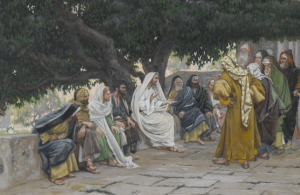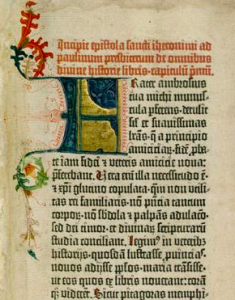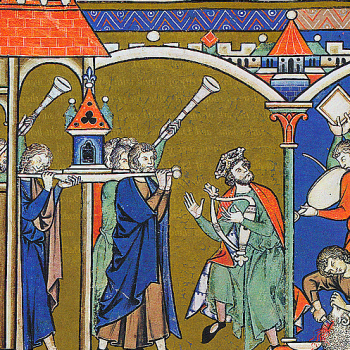The Parable of the Rich Man and His Barns
From a translator’s point of view, tomorrow’s Gospel passage is quite simple; nor is it complicated theologically. I think it’s absolutely unprecedented that I don’t even have any footnotes!
It is, also, a very unwelcome Gospel for today’s society. We like thinking of our income and our property as ours. This parable from Luke simply tell us bluntly that they’re not. The best advice I have to offer—not that it’s very useful advice; “I have” is a load-bearing phrase there—is to get over it.
Luke 12:13-21, RSV-CE

Jesus Is Questioned by the Sadducees
(ca. 1900?), by James Tissot.
One of the multitude said to him, “Teacher, bid my brother divide the inheritance with me.” But he said to him, “Man, who made me a judge or divider over you?” And he said to them, “Take heed, and beware of all covetousness; for a man’s life does not consist in the abundance of his possessions.” And he told them a parable, saying, “The land of a rich man brought forth plentifully; and he thought to himself, ‘What shall I do, for I have nowhere to store my crops?’ And he said, ‘I will do this: I will pull down my barns, and build larger ones; and there I will store all my grain and my goods. And I will say to my soul, Soul, you have ample goods laid up for many years; take your ease, eat, drink, be merry.’ But God said to him, ‘Fool! This night your soul is required of you; and the things you have prepared, whose will they be?’ So is he who lays up treasure for himself, and is not rich toward God.”
Luke 12:13-21, my translation
Some from the crowd said to him: “Teacher, tell my brother to divide the inheritance with me.”
He said to him, “Man, who set me down as judge or arbitrator over you?” Then he told them: “Watch, and be on guard against all greed, because no one’s life consists in possessing an excess.” He spoke to them by analogy, saying: “A certain rich person’s land bore well. And he debated with himself, saying, ‘What will I do—because I do not have a place to gather my crops?’ And he said, ‘This is what I will do: I will take down my warehouses and put up bigger ones, and I will gather all my grain and goods there; and I will tell my soul, “Soul, you have many goods laid up for many years; rest, eat, drink, and be merry.”‘ Then God told him, ‘Stupid, this very night your soul is asked back from you; the things you prepared, whose will they be?’ He is just so who treasures things up for himself and is not rich to God.”
Textual Notes
a. Man | Ἄνθρωπε [anthrōpe]: Usually I translate this word as “person,” since it’s the word that primarily means “human in contrast with non-human” (rather than “man in contrast with woman”); but “person” isn’t really used for direct address in English.

b. covetousness/greed | πλεονεξίας [pleonexias]: The word πλεονεξία is a quite vivid one in Greek; it literally translates as “more-having.”
c. crops | καρπούς [karpous]: “Fruit” is the most literal translation of this word, but only in the sense that any “thing born” is a fruit. (The name Polycarp means “much fruit,” and, especially since St. Polycarp was a disciple of St. John, it may have been chosen with the text of John 15:5 in mind.)
d. I will say to my soul, ‘Soul’/I will tell my soul, “Soul” | ἐρῶ τῇ ψυχῇ μου· Ψυχή [erō tē psüchē mou: psüchē]: Whether ψυχή is rendered “soul” or “life,” we obviously have no clear, direct equivalent manner of speaking in English, so the translator must either go with “clunky” or “extremely free”; the latter choice would probably result in something like “I will tell myself, ‘Well now, you have many goods,'” etc.
e. is required/is asked back | ἀπαιτοῦσιν [apaitousin]: This verb, ἀπαιτέω [apaiteō], is a conspicuous one; it occurs only twice in the New Testament, both times in Luke (the other place it’s used is in Luke 6:30). It indicates specifically asking for something that is owed—the payment of a debt, the return of an object loaned, that kind of thing. On the distinct but intimately related subject of time, the devil has this to say:

The assumption which you want him to go on making is so absurd that, if once it is questioned, even we cannot find a shred of argument in its defense. The man can neither make, nor retain, one moment of time; it all comes to him by pure gift; he might as well regard the sun and moon as his chattels. …The sense of ownership in general is always to be encouraged. The humans are always putting up claims to ownership which sound equally funny in Heaven and in Hell and we must keep them doing so. … [T]he joke is that the word “Mine” in its fully possessive sense cannot be uttered by a human being about anything. In the long run either Our Father or the Enemy will say “Mine” of each thing that exists, and specially of each man. They will find out in the end, never fear, to whom their time, their souls, and their bodies really belong—certainly not to them, whatever happens.
—C. S. Lewis, The Screwtape Letters, XXI












